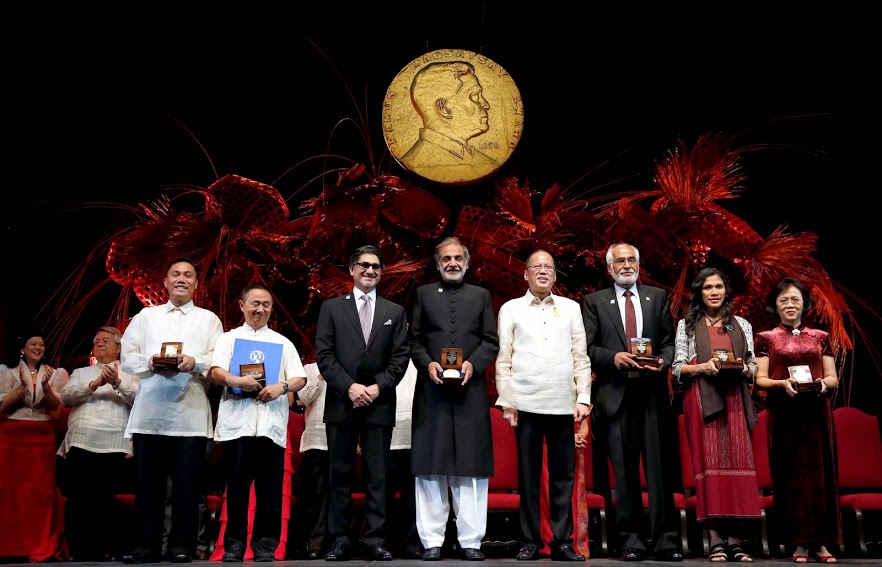Art and Culture
President Aquino hails 2014 Ramon Magsaysay awardees

President benigno S. Aquino III poses with the 2014 Ramon Magsaysay awardees (from left) Randy Halasan, Philippines; Wang Canfa, China; The Citizen Foundation (two representatives), Pakistan; Saur Marlina Manurung, Indonesia; and Ho Shuli, China during the presentation ceremonies Sunday (August 31) at the Cultural Center of the Philippines in Pasay City, Philippines. Established in 1957, the Ramon Magsaysay Awards is Asia’s highest honor and is widely regarded as the region’s equivalent to the Nobel Prize. (Photo by Gil Nartea/Malacanang Photo Bureau)
MANILA — President Benigno S. Aquino III on Sunday hailed the recipients of the 2014 Ramon Magsaysay Award during a ceremony at the Cultural Center of the Philippines in Pasay City.
“This year’s roster (of awardees) … is composed of individuals imbued with the missionary zeal to promote social justice, and each one of them has taken a personal stand to contribute to the improvement of the communities in which they live,” the President said during his speech.
He said each of them has confronted longstanding problems and has found innovative ways to address them.
“In other words, they have not been content to complain, but have been inspired to act, with solutions that are relevant and replicable,” he noted.
“I am hopeful that more men and women will follow the footsteps of Ramon Magsaysay and our awardees today, so that we may work together and rise up to the challenge of our times, fulfill the collective promise of our world, and bequeath future generations a global community that is, without doubt, better than we found it,” he added.
The Ramon Magsaysay Award Foundation this year recognized the efforts of Chinese journalist Hu Shuli; Indonesian anthropologist Saur Marlina Manurung; National Museum of Afghanistan deputy director Omara Khan Masoudi; Chinese environmental lawyer Wang Canfa; The Citizen Foundation from Pakistan; and Filipino teacher Randy Halasan.
Chinese journalist Hu Shuli was recognized for her “unrelenting commitment to truthful, relevant and unassailable journalism, and her leadership in blazing the way for a more professional and independent-minded media practices in China”. In 1988, Hu established and edited the business magazine Caijing, which published investigative reports that led to the ousting of high public officials, the prosecution of corporate leaders, and reforms in China’s stock market. This earned her the reputation of being “the most dangerous woman in China.”
Indonesian anthropologist Saur Marlina Manurung was commended for her “ennobling passion to protect and improve the lives of Indonesia’s forest people.” Together with four other colleagues, Saur Marlina established the Sokola Rimba or ‘Jungle School’. They customized their teaching, focusing on life skills rather than academic knowledge, basic literacy for children, and practical skills to cope with the changing forest environment. She also broke cultural taboos that discourage girls from getting an education.
When the Taliban were destroying what they considered “non-Muslim” heritage amid the civil strife in Afghanistan, Omara Khan Massoudi and his colleagues moved artifacts from the National Museum of Afghanistan to safer locations and hid them in secret vaults under Kabul’s streets. When Taliban rule ended in 2002, he was able to retrieve the collections, restore historical monuments and negotiate the return of cultural treasures moved or smuggled to other countries. For this, he was honored for his “courage, labor, and leadership in protecting Afghan cultural heritage.”
Pakistan’s nonprofit organization, The Citizen Foundation, endeavored to remove barriers of class and privilege by building schools that offered affordable, quality education in poor districts. For this, it was recognized for “the social vision and high-level professionalism of its founders and those who run its schools in successfully pursuing their conviction that quality education made available to all is the key to Pakistan’s brighter future.”
Lawyer Wang Canfa was commended for “his discerning and forceful leadership in ensuring that the enlightened and competent practice of environmental law in China protects the rights and lives of victims of environmental abuse.” Wang founded the Center for Legal Assistance to Pollution Victims, which is composed of a pool of pro bono volunteer lawyers who give free legal assistance to victims of pollution. He and his team filed more than 550 cases, including class action suits involving as many as 1,721 plaintiffs.
Randy Halasan, 31, a grade shool teacher in Pegalongan, one of the remotest villages in the mountainous hinterland of Davao City and home to the indigenous Matigsalug tribe, successfully lobbied for the expansion of a two-room, two-teacher school into a nine-room, eight-teacher school and the establishment of a high school for all tribe members. He is currently establishing food-sufficient communities in far-flung regions of Davao. For this, he was honored for “his purposeful dedication in nurturing his Matigsalug students and their community to transform their lives through quality education and sustainable livelihoods.”
The Ramon Magsaysay Award was established in 1957 to honor individuals and organizations whose contributions have enhanced selfless service to the peoples of Asia. It is Asia’s highest honor and is considered as the region’s equivalent of the Nobel Prize.





















